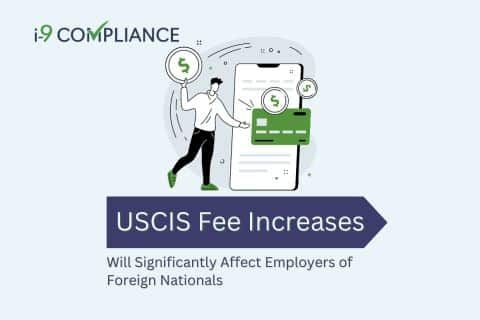USCIS Fee Increases Will Significantly Affect Employers of Foreign Nationals

November 02, 2023
The U.S. Citizenship and Immigration Services (USCIS) published a proposal to increase fees back in January. The increase intends to help cover more of the agency’s operational costs. This proposal would also improve its customer service by lowering processing times, which could help prevent backlogs in the future. However, they stated they will not finalize the rule until March 2024.
The fee increase would also prove significant for many employers. For example, those filing an Application to Register Permanent Residence or Adjust Status (Form I-485) must pay $1,540, up from $1,225. Finalizing the rule also means combining the biometric service fees with the primary price. The Application for Employment Authorization (Form I-765) and Application for Travel Document (Form I-131) would become separate fees.
However, those with children who file with them will no longer receive a discount. They must pay the same fee as adults. Despite this change, the USCIS explained its intention to increase prices for those capable of affording them. Otherwise, the agency would decrease or waive fees for those unable to afford filing costs. Examples of those unable to afford filing include victims of human trafficking and people seeking asylum.
Effects of Fees on Employers
Employers choosing to sponsor foreign nationals will face significantly higher costs. Increased filing fees will cost employers more to sponsor workers for employment-based visas, including O-1, L-1, or H-1B. These increased fees could force some employers to reconsider how many foreign workers they can afford to sponsor.
Employers helping their employees in the adjustment of status process to obtain permanent residency will also face increased costs. For example, they will pay more to file Form I-485. They must also pay the filing fees for Form I-131 and Form I-765 because these will have separate filing fees. Sponsoring employees for green cards will also cost more because of the higher fees for filing a Petition for Alien Relative (Form I-130).
Employers may avoid hiring foreign nationals due to the increased fees and choose to hire more U.S. citizens or permanent residents. However, this change could mean passing up talented foreign workers. Furthermore, small businesses may struggle to absorb the increased costs.
Conclusion
The USCIS will not publish the final rule until March 2024. As such, the agency may alter the rule to ease these concerns. Regardless, employers hiring foreign nationals must remember to complete the employment eligibility verification (Form I-9) process. This process applies to all workers, foreign and domestic. However, many businesses find it complicated due to the many forms foreign national workers may present.
The best way to ensure employees complete the form correctly is to use an electronic I-9 management system. This system can guide employers through the process, store forms and documentation, and provide alerts when action is needed to remain compliant.
Automate your employment eligibility verification today with the ensured compliance of I-9 Compliance.